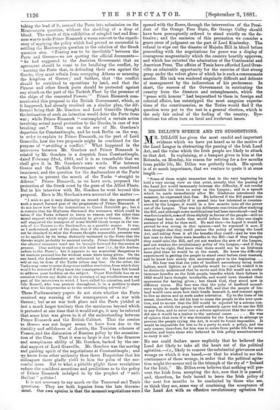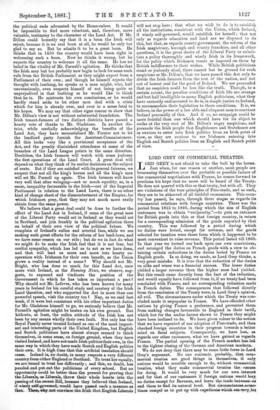MR. DILLON'S SPEECH AND ITS SUGGESTIONS.
MR. DILLON has given the most candid and important evidence which we have yet heard as to the motive of the Land League in obstructing the passing of the Irish Land Act, and the value which the Irish people are likely to attach to that Act. In explaining, at a banquet given to him at the Rotunda, on Monday, his reason for retiring for a few months from public life, Mr. Dillon was perfectly frank. His speech is of so much importance, that we venture to quote it at some length :— " Some of them might remember that in the very beginning he held a very strong view on that point, namely, that the passing of the Land Act would immensely increase the difficulty, if not render it impossible for them to carry on the League ; and in a speech which be made immediately after Mr. Gladstone introduced the measure, be expressed that fear. He believed if the Bill passed into law, and more especially if it passed into law tolerated or counten- anced by the League, it would in a few months take all the power out of the League. That was his deliberate conviction after studying the-Bill, and although some modifications had been introduced—and-he was free toadmit, some of them slightly in favour of the people—still no change had been made that would induce him to alter one single sentence of what he then said. He said then—he hoped it would be proved he was wrong in that opinion—and he repeated it now, if men thought that they could pursue the policy of trying the Land Act, and taking from it all the benefits they could—and he was the last man to deny there were benefits in the Bill—bat if they thought they could take the Bill, and yet not weaken the arm of the League, and not weaken the revolutionary policy of the League,—and if they proved to be right, God knew that there would not be an Irishman more glad than he would be at the result. He knew the difficulty experienced in getting the people to stand erect before their masters, and be knew how slowly this movement grew in the beginning. ... . . . His fear was that the yoke of landlord ascendancy being made lighter, much lighter, as it probably would be—and he wished it to be distinctly understood that he never said this Bill would not confer immense benefits on the Irish people, benefits which their fathers in 1852 would have thought invaluable, and would have thanked their oppressors for having given ; but thank God, they stood now in different times. His fear was that the yoke of landlord ascend- ancy might be made lighter by this Bill, and that the people of Ire- land would once more bow their heads beneath it, and oonsent again to live as slaves and as serfs under toleration. Up to the time of his arrest, therefore, he did his best to rouse the people to the true ques- tion, and to secure that the Bill would be rejected by a solemn con- vention, at which the people would solemnly agree not to use the Bill in any form, and to enter into a solemn agreement that the man who
did use it would be a traitor to the national cause He was of opinion that even if it was desirable for the League to attempt to prevent the people trying the Act, it would be found impossible. It would be impossible for him to be a party to such a policy, and the only course, therefore, for him was to retire from public life for some months, and leave those who believed in this policy unembarrassed to carry it out."
No one could declare more explicitly that he believed the Land Act likely to take all the heart out of the political agitation,-1.e., likely to remove the substantial grievances and wrongs on which it was based,—or that he wished to see the continuance of these wrongs, in order that the political agita- tion might the sooner end in the triumph of the cry of "Ireland for the Irish." Mr. Dillon even believes that nothing will pre- vent the Irish from accepting the Act, now that it is passed ; and, therefore, he feels bound to leave the Irish policy of the next few months to be conducted by those who see, or think they see, some way of combining the acceptance of the Land Act with an- effective revolutionary agitation for the political ends advocated by the Home-rulers. It would be impossible to find more reluctant, and, therefore, more valuable, testimony to the character of the Land Act. If Mr. Dillon could honestly say that it is a boon the Irish will reject, because it is no real boon at all, he would be only too glad to say so. But he admits it to be a great boon. He thinks that in 1850 the country would have been right in welcoming such a boon. Now he thinks it wrong, but he expects the country to welcome it all the same. He has no belief in the vitality of Mr. Parnell's agitation. He thinks that the Irish may but too probably now begin to look for some such rule from the British Parliament as they might expect from a Parliament of their own ; and though he himself rejects the thought with loathing, he speaks as a man might, who, half unconsciously, even suspects himself of not being quite so unprejudiced in that loathing as he would like to think that he is. He mistrusts his own conclusions, or he would hardly stand aside to let other men deal with a crisis which for him is already over, and over in a sense fatal to his hopes. We may say that other signs concur to show that Mr. Dillon's view is not without substantial foundation. The Irish tenant-farmers of two distinct districts have passed a hearty vote of thanks to Mr. Gladstone. In another dis- trict, while cordially acknowledging the benefits of the Land Act, they have memorialised Mr. Forster not to let the landlord party furnish the Assistant-Commissioners. All this looks very like a provisional acceptance of the Act, and the greatly diminished attendance at some of the branches of the Land League points in the same direction. Doubtless, the Irish farmers will watch with some jealousy the first operations of the Land Court. A great deal will depend on what they think of its earlier decisions on the subject of rents. But if they are satisfied with its general fairness, we suspect that not all the king's horses and all the king's men will set Mr. Parnell up again. The Irish farmers will know very well that after wringing—not so much equality, as, in a sense, inequality favourable to the Irish—out of the Imperial Parliament in relation to the Land Laws, there is no other kind of change short of the dismemberment of the Empire, for which Irishmen pray, that they may not much more easily obtain from the same power.
We believe that a great deal could be done to further the effect of the Land Act in Ireland, if some of the great men of the Liberal Party would act in Ireland as they would act in Scotland, and join_ frankly in the political agitation there on behalf of their own view of the political future. We complain of Ireland's sullen and averted face, while we are making such great efforts for the reform of her land-laws, and we have some reason on our side • but do we in fact do what we might do to make the Irish feel that it is not fear, but cordial sympathy, which has led us to act as we have done, and that will lead us more and more into hearty co- operation with Irishmen for their own benefit, as the Union grows a reality instead of a name I Why should not Mr. Bright, who has done so much for this Land Act, once more visit Ireland, as the Evening News, we observe, sug- gests, to expound and vindicate the position of the Government in which he has taken so important a part? Why should not Mr. Lefevre, who has been known for many years in Ireland for his careful study and mastery of the Irish Land Question, and who supported the Act in more than one powerful speech, visit the country too Nay, as we said last week, if it were but consistent with his other important duties for Mr. Gladstone himself to go, we seriously believe that Mr. Parnell's agitation might be beaten on his own ground. But hitherto, at least, the sullen attitude of the Irish has not been by any means wholly their own fault. Not only has the Royal Family never treated Ireland as one of the most import.. ant and interesting parts of the United Kingdom, but English and Scotch politicians have almost always seemed to think themselves, in some sense, on foreign ground, when they have visited Ireland, and have not made Irish politics their own, in the same way in which they have made Scotch and English politics their own. It is high time that this artificial insulation should cease. Ireland is, no doubt, in many respects a very different country from either England or Scotland. To treat her equally, we are bound to treat her differently ; and this, no doubt, has puzzled and put out the politicians of every school. But no opportunity could be better than the present for proving that the Liberals, as Liberals, threw their whole hearts into the passing of the recent Bill, because they believed that Ireland, if wisely ee16-geverned, would have passed such a measure as amt. Thews why met convince the Irish that English Liberals will not stop here ; that what we wish to do is to establish all the institutions, consistent with the Union, which Ireland, if wisely self-governed, would establish for herself ; that not only as regards education and land are we disposed to do this, but that, as regards county government, the reform of the Irish magistracy, borough and county franchise, and all other questions, it is the great desire of the Liberal Party to substi- tute a policy thoroughly and wisely Irish in its framework, for the policy which Irishmen resent as imposed on them by British indifference to their wishes. While British politicians stand so jealously aloof, there cannot but be ground for such suspicions as Mr. Dillon's, that we have passed this Act only to divide the Irish farmers from the rest of the nation, and not out of honest zeal for the good of Ireland. We are persuaded that no suspicion could be less like the truth. Though, to a certain extent, the peculiar conditions of Irish life are strange and but half intelligible to many English politicians, what they have earnestly endeavoured to do is, in simple justice to Ireland, to accommodate their legislation to those conditions. It is, we believe, in the power of a few able and eloquent men to convince Ireland personally of this. And if so, no campaign could be more fruitful than one which should have for its object to strike at the very root of Mr. Dillon's angry suspicions, and persuade the Irish people that Englishmen and Scotchmen are as anxious to enter into Irish politics from an Irish point of view, as they are anxious to see Irishmen entering into English and Scotch politics from an English and Scotch point of view.



































 Previous page
Previous page